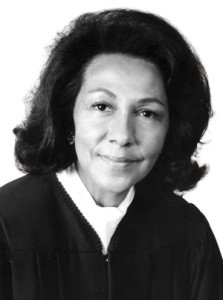SWLAW Blog | Alumni

November 10, 2016
Hon. Vaino Spencer ’52, Trailblazing Alumna, Dies at 96
Retired Court of Appeal Presiding Justice Vaino Spencer ‘52, who became the first African American woman appointed to the bench in California, died on October 25 at age 96. When Governor Edmund G. “Pat” Brown named Vaino Spencer to the Los Angeles Municipal Court, she had not yet reached the 10th Anniversary of her Southwestern graduation.
A trailblazer for women and African Americans in the legal profession, Spencer served as Presiding Justice of the California Court of Appeal, Second Appellate District, Division One. She retired in 2007, after a distinguished 46-year career on the bench. She was the third black woman in California to pass the State Bar exam and the third to open a law practice in Los Angeles. However, it was her appointment to the Los Angeles Municipal Court in 1961 that confirmed her status as a true pioneer—when she became California’s first black woman judge, and the third in the nation. Governor Jerry Brown appointed Spencer to the Superior Court in 1976, and four years later he elevated her to the Court of Appeal.
California Supreme Court Chief Justice Tani Cantil-Sakauye said, “Justice Spencer was a double pioneer—a pioneer for women on the bench and a pioneer for people of color on the bench in Los Angeles, statewide, and nationally. Her roles with California Women Lawyers and the National Association of Women Judges laid the groundwork for women like me to even consider a career in the legal profession, to advance within the profession, and to embrace positions of leadership. She leaves a legacy as a jurist in her opinions and as a role model in the person she was.”
Southwestern’s Dean Susan Prager was one of the beneficiaries of Justice Spencer’s efforts to support and encourage women: “At the time my appointment as Dean at UCLA was announced in 1982, two extraordinary women, Justice Joan Dempsey Klein and Justice Vaino Spencer reached out to me and invited me to lunch. I was 39 years old, and while Dorothy Nelson had been a highly successful Dean at USC, at the time there were only two female Deans of the more than 160 ABA-approved law schools in the country. My memories of these two pathbreakers remain vivid. The stories they told me with humor and grace were intended to convey, indirectly, that my new professional life would be challenging. The supportive climate they created that day meant a great deal to me then, and over the ensuing years. And I know that this act of tangible support was just one of the many ways these two colleagues and friends worked to help so many of us accomplish what so many others thought we shouldn’t be doing at all.”
Justice Spencer was active in the Civil Rights movement and a leader in the community. She is also recognized for her groundbreaking efforts in support of gender equity in the legal profession and to increase the numbers of women appointed to the bench. In the 1970s, she founded the Black Women Lawyers Association, and co-founded the National Association of Women Judges (NAWJ) with Justice Joan Dempsey Klein. In 2007, the NAWJ awarded the first Justice Vaino Spencer Leadership Award in her honor.
Beyond the courtroom, Justice Spencer served on the California Law Revision Commission, National Judicial Council, Judicial Council of California, and Attorney General’s Advisory Committee on Constitutional Rights, and was an officer and director of the Los Angeles County Commission on Justice. She held leadership posts in over two dozen professional and community organizations including the Democratic State and County Central Committees, the Democratic Minority Conference, the California Mental Health Association, the Neighborhood Economic Development Corporation, the NAACP Executive Board, the National Bar Association, and the Langston Bar Association.
Over the years, Justice Vaino Spencer remained closely involved with Southwestern. She served on the boards of the Alumni Association, the Tom Bradley Scholarship Endowment Fund, and the planning committee for the Gilbert and Theresa Lindsay Scholarship Endowment Fund. She received the “Outstanding Judicial Officer” award from Southwestern in 1989, and an honorary Doctor of Laws degree from the law school in 1996.
Her numerous other honors include initiation into the Langston Bar Association Hall of Fame (1991); Honoree of the Year (1992) from the National Association of Women Judges; the Lifetime Achievement Award (1991) from the Judicial Council of the National Bar Association; the Trailblazer Award (1985) from the National Association of Business and Professional Women; the Bernard Jefferson Appellate Justice Award (1983) from the California Association of Black Lawyers; and the Judge Ernestine Stahlhut Award (1976) from the Los Angeles Women Lawyers Association.
The Southwestern community, with whom she held close ties throughout the years, will continue to honor her, remember her and to draw on her life to inspire successive generations of students.